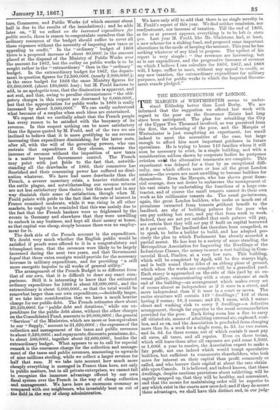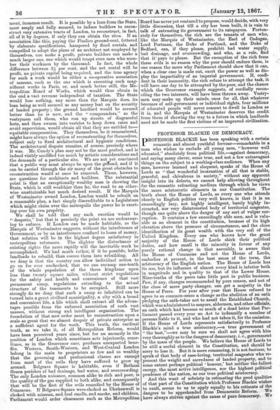THE RECONSTRUCTION OF LONDON.
THE MARQUIS of WESTMINSTER seems to under- stand Edileship better than Lord Derby. We are informed that the suggestion we offered last week with regard to the poor on the Grosvenor Estate had long since been anticipated. The plan for rebuilding the City of the Upper Two Thousand involved, as was perceived from the first, the rehousing of the poor, and the Marquis of Westminster is just completing an experiment, too small indeed to meet the necessities of the case, but large enough to afford him most important guidance in future operations. He is trying to house 149 families whom it will soon be necessary to evict, in a single building, and with a consideration seldom shown by corporate bodies he postpones eviction until the alternative tenements are complete. This experiment was delayed for a time by an exceptional diffi- culty, one which affects more or less all the great London estates—the owners are most unwilling to become builders for themselves. Even the Marquis, who has shown great finan- cial courage, does not desire to embarrass the management of his vast estate by undertaking the functions of a huge con- tractor, and of course the small tenants cannot do their own work as his millionaire tenants do. The usual go-betweens, again, the great London builders, who make so much out of premiums extracted from tenants awithout benefit to the landlord, are shy of building palaces for the poor who can pay nothing but rent, and pay that from week to week. Indeed, they are not yet satisfied that such palaces will pay, are certain that they will not pay if built on capital borrowed at 8 per cent. The landlord has therefore been compelled, so to speak, to bribe a builder to build, and has adopted pre- cisely the plan to which Parliament has already accorded a partial assent. He has lent to a society of some standing, the Metropolitan Association for Improving the Dwellings of the Industrious Classes, the money to erect a vast building in Com- mercial Road, Pimlico, at a very low rate. This building, which will be completed by April, will be five storeys high, and is built round three sides of an oblong piece of ground, which when the works are complete will be a gravelled yard. Each storey is approached on the side of this yard by an ex- ternal gallery, communicating with a stone staircase at each end of the building—an arrangement which makes every set of rooms almost as independent as if it were in a street, and more independent than if it were in a court or mews. The entire structure will contain 149 " dwellings ..;" 102 of them having 2 rooms; 18, 3 rooms; and 29, 1 room, with 1 water- closet and washing sink to every 2 dwellings—a defective arrangement, though far superior to the usual accommodation provided for the poor. Each living room has a flue to carry off vitiated air, means of admitting external air, cupboard, coal- box, and so on, and the Association is precluded from charging more than 3s. a week for a single room, 4s. 3d. for two rooms, and 5s. 6d. for three rooms, out of which rentals it must pay all rates, all taxes, and all repairs. Even on these terms, which will leave them after all expenses are paid some 1,500/. or 1,600/. a year to receive, the Association expect to make a fair profit, not one indeed which would tempt speculative builders, but sufficient to remunerate shareholders, who look more for interest on their capital than profit commonly so called, and who borrow their capital at about the rate obtain able upon Consols. It is believed, and indeed known, that these dwellings, despite cautious provisions about subletting, will be eagerly snapped up, that they will be healthy, and convenient, and that the means for maintaining order will be superior to any which exist in the courts now crowded; and if they do secure these advantages, we shall have this distinct and, in our judg- meat, immense result. It is possible by a loan from the State, most amply and fully secured, to induce builders to recon- struct very extensive tracts of London, to reconstruct, in fact, all of it by degrees, if only they can obtain the sites. If an association like this, paying the Pimlico ground-rent, fettered by elaborate specifications, hampered by fixed rentals, and compelled to adopt the plans of an architect not employed by themselves, can make a profit, private builders can make a much larger one, one which would tempt even men who num- ber their workmen by the thousand. In fact, the whole difference between 31 per cent, and the net rental will be profit, no private capital being required, and the true agency for such a work would be either a co-operative association of masons, such as the one which is executing such mag- nificent works in Paris, or, and much better still, the Me- tropolitan Board of Works, which would thus obtain in the end a vast revenue independent of taxation. The State would lose nothing, any more than the Marquis does, its loan being as well secured as any money lent on the security of landed property ; the ground landlord would be secured better than he is now, and the "compounders," as the vestrymen call them, who run up streets of disgraceful huts, and then swarm into vestries to keep down rates and avoid supervision, would obtain all that they are entitled to— equitable compensation. They themselves, be it remembered, might have always the option of reconstructing for themselves, subject only to fixed architectural and hygienic conditions. The architectural dispute remains, of course, precisely where it was. Mr. Cundy's plan may not be the most perfect, and is indeed visibly modified too much by artistic considerations and the demands of a particular site. We are not yet convinced that a public way must always be upon the grtund, and if it can be carried through the air many of the great obstacles to reconstruction would at once be removed. These, however, are questions for architects and builders. The substantial point is that an exceptionally wealthy man is showing the State, which is still wealthier than he, the road to an other- wise unattainable but much desired result. If the Marquis of Westminster owned London, London would be rebuilt on a reasonable plan, a fact simply discreditable to a Legislature which might claim over the metropolis the power he is exert- ing over his own property.
We shall be told that any such exertion would be "despotic," but that is precisely the point we are endeavour- ing to enforce. If London can be made habitable, as the Marquis of Westminster suggests, without the interference of Government, or by an interference confined to loans of money, that solution will be in the highest degree satisfactory to metropolitan reformers. The slighter the disturbance of existing rights the more rapidly will the inevitable work be accomplished. We had much rather, if it be possible, bribe landlords to rebuild, than coerce them into rebuilding. All we deny is that the country can allow individual action to go on for ever unchecked, that we can encamp one-tenth of the whole population of the three kingdoms upon less than twenty square miles, without strict regulations for the safety and health and convenience of that vast permanent camp, regulations extending to the actual structure of the tenements to be occupied. Still more strongly do we deny that such a camp so inhabited can be turned into a great civilized municipality, a city with a broad and convenient life, a life which shall extract all the advan- tages possible from the enforced association of such vast masses, without strong and intelligent organization. The foundation of that new order must be reconstruction upon a scale so great that we almost despair of private enterprise as a sufficient agent for the work. This truth, the cardinal truth, as we take it, of all Metropolitan Reform, would have been perceived years since, but for an anomaly in the position of London which sometimes acts injuriously, some- times, as in the Grosvenor case, produces unexpected bene- fits. Western, South-Western, and West-Central London belong in the main to proprietors so few and so wealthy that the governing and professional classes are exempt from most of the evils they have suffered to grow up around. Belgrave Square is habitable, even if Bethnal Green perishes of bad drainage, bad water, and overcrowding.
The only London nuisance, common alike to rich and poor, is the quality of the gas supplied to both alike, and consequently that will be the first of the evils remedied by the House of Commons. If Belgrave Square were choked as Clerkenwell is choked with miasma, and, foul smells, and smoke, and children, Parliament would order clearances such as the Metropolitan Board has never yet ventured to propose, would decide, with very little discussion, that till a city has been built, it is vain to talk of entrusting its government to its ratepayers. Fortun- ately for themselves, the rich are the tenants of men who, like the Marquis of Westminster, the Earl of Cadogan, Lord Portman, the Duke of Portland, and the Duke of Bedford, can, if they please, prohibit bad water supply, bad drainage, and overcrowding, and who, as a rule, find that it paysto please. But the exemption of the rich from these evils is no reason why the poor should endure them, is one reason the more why Parliament should show that it can, when a clear case is made out, exert the power as well as dis- play the impartiality of an imperial government. If, confi- dent in their immunity, the rich refuse to attempt the task, it will have one day to be attempted by the poor, and the chance which the Grosvenor example suggests, of cordially recon- ciling the two interests, will have been thrown away. Vestry- men may make up their minds, once for all, that whatever becomes of self-government or individual rights, four millions of educated people will never consent to dwell in London as it is, and the Marquis of Westminster deserves the credit from them of showing the way to a future in which landlords need not be made the first victims of an improved civilization.































 Previous page
Previous page